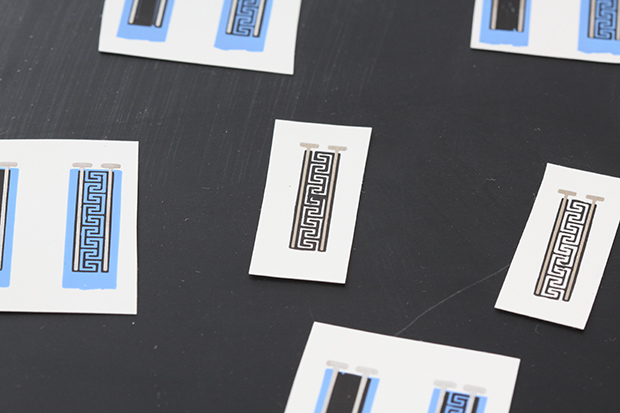
Renewable Energy Program Pushes Novel Concepts Forward
By:
- Catherine Hockmuth
Published Date
By:
- Catherine Hockmuth
Share This:
Article Content

Printed biofuel cells designed to convert wastewater, urine and sewage into energy are being developed for military applications by Joshua Windmiller, a postdoctoral researcher in the Nanobiosensor and Nanobioelectronics Laboratory of Professor Joseph Wang, Department of NanoEngineering, Jacobs School of Engineering. Windmiller is one of four researchers from Southern California to receive a von Liebig Center fellowship to pursue the commercialization of renewable energy sources.
The von Liebig Center for Entrepreneurism and Technology Advancement at the University of California, San Diego Jacobs School of Engineering has awarded four new graduate von Liebig fellowships to pursue the commercialization of research that will increase energy efficiency and the growth of renewable energy sources. The fellowships are funded through the Southern California Clean Energy Technology Acceleration Program, funded by the U.S. Department of Energy’s Office of Energy Efficiency and Renewable Energy and in partnership with UC San Diego Rady School of Management and San Diego State University.
The fellowship helps accelerate the commercialization of novel clean energy technologies in such areas as solar energy, wind energy, advanced materials, vehicles and fuels that are developed within research institutes and universities.
The winners, selected from a pool of 12 finalists, were selected by an expert panel of reviewers based on the commercial potential of their technology and its state of development.
The awardees are:
- Joshua Windmiller, a postdoctoral researcher working in the lab of UC San Diego nanoengineering Professor Joe Wang, is working on a commercially viable printed biofuel cell that could derive power from urine, sewage and other wastewater sources. The technology is designed to meet a need for field-deployable and mobile power solutions particularly for recharging the electronic devices that soldiers carry with them into the battlefield such as night vision goggles, GPS systems, and two-way radios in order to prolong deployments. This technology could lighten the load of batteries soldiers must carry with them on missions into remote areas.
- Derek Butler, a chemistry Ph.D. candidate at San Diego State University, is proposing to develop a new and reusable source of fuel called “lignocellulosic biomass” that is derived from agricultural residues such as corn stover and bagasse as well as wood residue from pulp and paper mills. These potential fuels sources are readily available and sustainable.
- University of Southern California’s Ph.D. Candidate Kanchana Gunasekera is developing a novel method of increasing the efficiency of internal combustion engines with minimal modifications. His method relies on transient plasma ignition, a sparkplug replacement with no single spark, which enables a more uniform burn that was developed at USC. To optimize TPI and also meet emissions standards, turbulence in the fuel flow needs to be reduced. This project will experiment with modified fuel injectors and piston heads to optimize TPI. The goal is to demonstrate a 20% improvement in fuel efficiency while reducing engine complexity and keeping cost constant.
- Wei Yu, a Ph.D. candidate in the Bioengineering Department at UCLA, working in professor Chih Ming Ho’s Micro Systems Laboratories, has devised a novel strategy to increase the oil and protein production of Botryococcus Braunii, which could be subsequently converted into fuels and also used as feedstock. This approach could also shorten the growth cycle of B.braunii, which could possibly increase the harvest frequency and save time and cost for cultivating cells. Microalgal biofuel is still rarely used in the field of energy refinery due to its low yield
"We are very pleased with the quality of the applications and the enthusiasm demonstrated by the students and their faculty advisors that participated in this program,” said Rosibel Ochoa, executive director of the von Liebig Center at UC San Diego, who will oversee the program. “This program offers the selected von Liebig Fellows, the opportunity to focus over the period of one year on a technology development and commercialization plan that will increase the likelihood that their technologies will successfully translate into real-world solutions.”
All von Liebig Fellows receive business mentoring from the von Liebig Center’s technology and business advisors and are teamed with one to three MBA Fellows from the Rady School of Management or San Diego State University, who will provide business model development while learning about technology development by working with the von Liebig Fellows.
“Understanding customers and their needs is critical for successful translation of new technologies to market,” said Lada Rasochova, director of the Entrepreneurship Programs and managing director of the Rady Venture Fund at the UC San Diego Rady School of Management. Rasochova is working closely with the von Liebig Center to implement the program. “Business students bring product and business development expertise into the technology translation process. They will be working directly with technical students shaping the new products to meet market needs,” said Rasochova.
Over the next 12 months, von Liebig Fellows will be awarded $40,000 to conduct proof-of-concept studies, technology development and preliminary market research to determine the commercial feasibility of their technologies. Fellows will receive mentoring from the von Liebig Center’s technology and business advisors and will have the opportunity to team with MBA Innovation fellows from the Rady School of Management and San Diego State University.
Josh Windmiller discusses how to make a printed biofuel cell to convert wastewater or urine into energy.
Share This:
You May Also Like
Stay in the Know
Keep up with all the latest from UC San Diego. Subscribe to the newsletter today.


